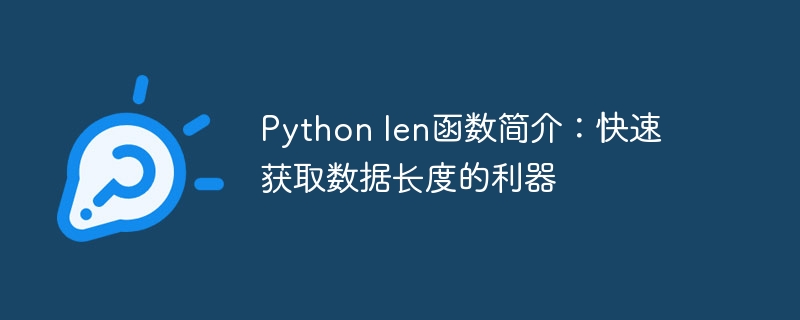

Introduction to Python len function: A powerful tool for quickly obtaining data length, specific code examples are required
In Python programming, the len function is a very commonly used and practical function. Its function is to get the length of data, whether it is a string, list, tuple, set, dictionary, etc. Through the len function, we can quickly get the length of the data, which facilitates us to perform a series of operations and judgments.
Using the len function is very simple. Its syntax is: len(object), where object can be a string, list, tuple, set or dictionary, etc. Let's look at some examples in detail.
string = "hello world"
length = len(string)
print("字符串长度为:", length)The output result is: the string length is: 11
list_1 = [1, 2, 3, 4, 5]
length = len(list_1)
print("列表长度为:", length)The output result is: the list length is: 5
tuple_1 = (1, 2, 3, 4, 5)
length = len(tuple_1)
print("元组长度为:", length)The output result is: the tuple length is: 5
set_1 = {1, 2, 3, 4, 5}
length = len(set_1)
print("集合长度为:", length)The output result is: the set length is: 5
dict_1 = {'a': 1, 'b': 2, 'c': 3}
length = len(dict_1)
print("字典长度为:", length)The output result is: the dictionary length is: 3
It should be noted that when using the len function to obtain the length of the dictionary, what is actually obtained is the key of the dictionary The number of value pairs, not all keys or all values in the dictionary.
To summarize, the len function is a very practical function in Python programming. Through it, we can quickly obtain the length or number of elements of various data types such as strings, lists, tuples, sets, and dictionaries.
Length is often combined with operations such as judgment and looping to help us process data more flexibly. Therefore, reasonable use of the len function can improve our efficiency and convenience in Python programming.
The above is the detailed content of The len function in Python: an efficient and fast way to obtain the length of data. For more information, please follow other related articles on the PHP Chinese website!




